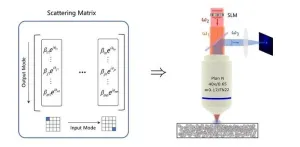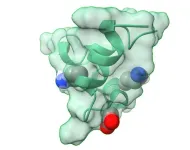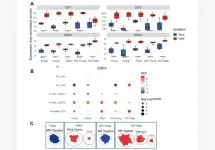(Press-News.org) *Note- this is an early release from the Annual Meeting of the European Association for the Study of Diabetes (EASD) meeting in Hamburg, October 2-6. Please credit the meeting if you use this story*
New research to be presented at this year’s Annual Meeting of the European Association for the Study of Diabetes (EASD) in Hamburg, Germany (2-6 October) shows that use of low dose (100mg daily) aspirin among older adults aged 65 years and older is associated with a 15% lower risk of developing type 2 diabetes. The authors, led by Professor Sophia Zoungas, School of Public Health and Preventive Medicine, Monash University, Melbourne, Australia, say the results show that anti-inflammatory agents such as aspirin warrant further study in the prevention of diabetes.
The effect of aspirin on incident type 2 diabetes among older adults remains uncertain. This study investigated the randomised treatment effect of low dose aspirin on incident diabetes and fasting plasma glucose (FPG) levels among older adults. The authors did a follow-up study of the ASPREE trial - a double-blind, placebo-controlled trial of aspirin, the principal results of which were published in NEJM in 2018. The original study showed that aspirin conferred a 38% increased risk of major haemorrhage in older adults without any reduction in incidence of cardiovascular disease.
The study enrolled community-dwelling individuals aged 65 years or over, and free of cardiovascular disease, independence-limiting physical disability and dementia. Participants were randomised 1:1 to 100 mg daily aspirin or placebo. Incident diabetes was defined as self-report of diabetes, commencement of glucose lowering medication, and/or a fasting plasma glucose (FBP) level of 7.0 mmol/L or higher at annual follow-up visits. Patients with diabetes at the start of the study were excluded. Computer and statistical modelling assessed the effect of aspirin on incident diabetes and FPG levels respectively.
A total of 16,209 participants were included in the analysis (8,086 randomised to aspirin and 8,123 to placebo). Over a median follow-up of 4.7 years, 995 incident diabetes cases were recorded (aspirin: 459, placebo: 536). Compared with placebo, the aspirin group had a 15% reduction in incident diabetes and a slower rate of increase in FPG (difference in annual FPG change: -0.006 mmol/L).
The authors say: “Aspirin treatment reduced incident diabetes and slowed the increase in fasting plasma glucose over time among initially healthy older adults. Given the increasing prevalence of type 2 diabetes among older adults, the potential for anti-inflammatory agents like aspirin to prevent type 2 diabetes or improve glucose levels needs further study.”
However, Professor Zoungas adds: “The earlier published trial findings from ASPREE in 2018 showed aspirin did not prolong healthy independent living, but was associated with a significantly increased risk of bleeding, primarily in the gastrointestinal tract. Major prescribing guidelines now recommend older adults take daily aspirin only when there is a medical reason to do so, such as after a heart attack.”
“Although these new findings are of interest, they do not change the clinical advice about aspirin use in older people at this time.”
END
Study shows that low-dose aspirin associated with a 15% lower risk of developing diabetes in people aged over 65 years
However due to risk of bleeding in elderly, major prescribing guidelines now recommend older adults take daily aspirin only when there is a medical reason to do so, such as after a heart attack
2023-09-01
ELSE PRESS RELEASES FROM THIS DATE:
New grant to optimize gut microbes, boost health benefits of broccoli
2023-08-31
URBANA, Ill. — Love it or hate it, broccoli is chock-full of health-promoting chemicals linked to heart health, cancer prevention, immune function, weight management, and more. However, some people are less efficient than others at unlocking those chemical benefits. A research team at the University of Illinois Urbana-Champaign suggests gut microbe communities may be responsible for the variation. With a new grant from the USDA’s National Institute of Food and Agriculture, the team plans to identify which microbes maximize the benefits of broccoli and other brassica ...
Illuminating new horizons: Navigating nonlinear scattering with precision
2023-08-31
In the intricate world of light, a journey through inhomogeneous media often leads to distortions in space, time, spectrum, and polarization. These distortions, detrimental to applications like optical manipulation, imaging, and communication, have long posed a challenge. Enter the art of wavefront shaping (WS) — a potent tool for correcting these wave maladies in linear optics. But that's not all. Nonlinearity adds a twist, finding purpose in fields from biological sensing to phototherapy. Now, picture combining these forces — ...
Digging deeper into how vaccines work against parasitic disease
2023-08-31
COLUMBUS, Ohio – Scientists have established the effectiveness of vaccines they developed to prevent the disfiguring skin disease leishmaniasis in animal studies, and Phase 1 human trial planning is in motion for the most promising candidate.
But in new work, the research team has determined how these vaccine candidates, created using mutated disease-causing parasites, prompt molecular-level changes in host cells that have specific roles in helping generate the immune response.
Despite using the same CRISPR ...
Housing heroes: New program to support veterans experiencing homelessness
2023-08-31
Since 2009, the number of veterans experiencing homelessness across the United States has shrunk by more than 50%, according to a 2022 Department of Housing report.
With the support of a $150,000 grant from the Department of Veterans Affairs (VA), the University of Missouri School of Law Veterans Clinic is aiming to continue this trend here at home with a new program designed to further empower veterans in taking steps out of homelessness.
The Veterans Outreach Program will help attorneys connect with veterans experiencing homelessness with the goal of offering them the legal assistance ...
Mapping the coronavirus spike protein could provide insight into vaccine development
2023-08-31
Although the COVID-19 pandemic was the first time most of humanity learned of the now infamous disease, the family of coronaviruses was first identified in the mid-1960s. In a new study, molecular biologist Steven Van Doren, a scientist in the University of Missouri College of Agriculture, Food and Natural Resources, has uncovered unexpected actions of a key player in how the coronavirus infects its target — a discovery that could guide further vaccine development.
Funded by a National Science Foundation (NSF) grant, Van Doren and his team studied the fusion peptide, an important feature of the spike protein that serves to bind the virus with ...
Dectin-1 stimulation promotes distinct inflammatory signature in HIV and aging
2023-08-31
“To our knowledge, our study is the first to evaluate the specific function of Dectin-1 in the setting of aging and HIV-infection.”
BUFFALO, NY- August 31, 2023 – A new research paper was published on the cover of Aging (listed by MEDLINE/PubMed as "Aging (Albany NY)" and "Aging-US" by Web of Science) Volume 15, Issue 16, entitled, “Dectin-1 stimulation promotes a distinct inflammatory signature in the setting of HIV-infection and aging.”
Dectin-1 is an innate immune receptor that recognizes and binds β-1, 3/1, 6 glucans on fungi. In this new study, researchers Archit Kumar, Jiawei Wang, Allen Esterly, Chris ...
Excess ceramide and disrupted iron metabolism in neuronal mitochondria found to be the cause for MEPAN syndrome
2023-08-31
A recent study published in Nature Metabolism has revealed the pathogenic mechanism underlying a rare pediatric neurodegenerative disorder known as mitochondrial enoyl reductase protein-associated neurodegeneration (MEPAN) syndrome. The study was led by Dr. Hugo J. Bellen, distinguished service professor at Baylor College of Medicine, and Chair of Neurogenetics at the Jan and Dan Duncan Neurological Research Institute at Texas Children’s Hospital (Duncan NRI), and Dr. Debdeep Dutta, a postdoctoral fellow in the Bellen lab. The Duncan NRI team found that in patients and animal models of this disorder, a large number of neurons ...
A new approach to stop cancer growth?
2023-08-31
CLEVELAND– Case Western Reserve University biochemical researchers have identified a new function of a key protein that leads to cancer–a finding they believe could lead to more effective treatments for a range of cancers and other diseases.
The protein is LSD1 (lysine-specific histone demethylase 1A), which functions as a type of traffic cop inside human cells. It controls gene activity during embryonic development and regulating gene expression throughout life.
Scientists have also identified in recent years that the overexpression of LSD1—in this instance, producing too many proteins—can ...
Study: ‘Suicidal’ mechanism discovered in ion channel receptors enables the sensing of heat and pain
2023-08-31
BUFFALO, N.Y. – The ability to accurately detect heat and pain is critical to human survival, but scientists have struggled to understand on a molecular level exactly how our bodies sense these potential risks.
Now, University at Buffalo researchers have unraveled the complex biological phenomena that drive these critical functions. Their research, published in the Proceedings of the National Academy of Sciences on Aug. 28, has uncovered a previously unknown and completely unexpected “suicidal” reaction in ion channel receptors that explains the complicated mechanisms that underlie sensitivity to temperature and pain.
The ...
Scientists unpick how lung cells induce immune response to influenza
2023-08-31
Researchers from Trinity College Dublin have discovered some new and surprising ways that viral RNA and influenza virus are detected by human lung cells, which has potential implications for treating people affected by such viruses.
Influenza viruses remain a major threat to human health and can cause severe symptoms in young, elderly, and immuno-compromised populations, leading to annual epidemics which endanger between 3 and 5 million people of severe illness and cause 290,000 to 650,000 deaths worldwide.
These viruses primarily target respiratory epithelial cells ...
LAST 30 PRESS RELEASES:
Alkali cation effects in electrochemical carbon dioxide reduction
Test platforms for charging wireless cars now fit on a bench
$3 million NIH grant funds national study of Medicare Advantage’s benefit expansion into social supports
Amplified Sciences achieves CAP accreditation for cutting-edge diagnostic lab
Fred Hutch announces 12 recipients of the annual Harold M. Weintraub Graduate Student Award
Native forest litter helps rebuild soil life in post-mining landscapes
Mountain soils in arid regions may emit more greenhouse gas as climate shifts, new study finds
Pairing biochar with other soil amendments could unlock stronger gains in soil health
Why do we get a skip in our step when we’re happy? Thank dopamine
UC Irvine scientists uncover cellular mechanism behind muscle repair
Platform to map living brain noninvasively takes next big step
Stress-testing the Cascadia Subduction Zone reveals variability that could impact how earthquakes spread
We may be underestimating the true carbon cost of northern wildfires
Blood test predicts which bladder cancer patients may safely skip surgery
Kennesaw State's Vijay Anand honored as National Academy of Inventors Senior Member
Recovery from whaling reveals the role of age in Humpback reproduction
Can the canny tick help prevent disease like MS and cancer?
Newcomer children show lower rates of emergency department use for non‑urgent conditions, study finds
Cognitive and neuropsychiatric function in former American football players
From trash to climate tech: rubber gloves find new life as carbon capturers materials
A step towards needed treatments for hantaviruses in new molecular map
Boys are more motivated, while girls are more compassionate?
Study identifies opposing roles for IL6 and IL6R in long-term mortality
AI accurately spots medical disorder from privacy-conscious hand images
Transient Pauli blocking for broadband ultrafast optical switching
Political polarization can spur CO2 emissions, stymie climate action
Researchers develop new strategy for improving inverted perovskite solar cells
Yes! The role of YAP and CTGF as potential therapeutic targets for preventing severe liver disease
Pancreatic cancer may begin hiding from the immune system earlier than we thought
Robotic wing inspired by nature delivers leap in underwater stability
[Press-News.org] Study shows that low-dose aspirin associated with a 15% lower risk of developing diabetes in people aged over 65 yearsHowever due to risk of bleeding in elderly, major prescribing guidelines now recommend older adults take daily aspirin only when there is a medical reason to do so, such as after a heart attack




